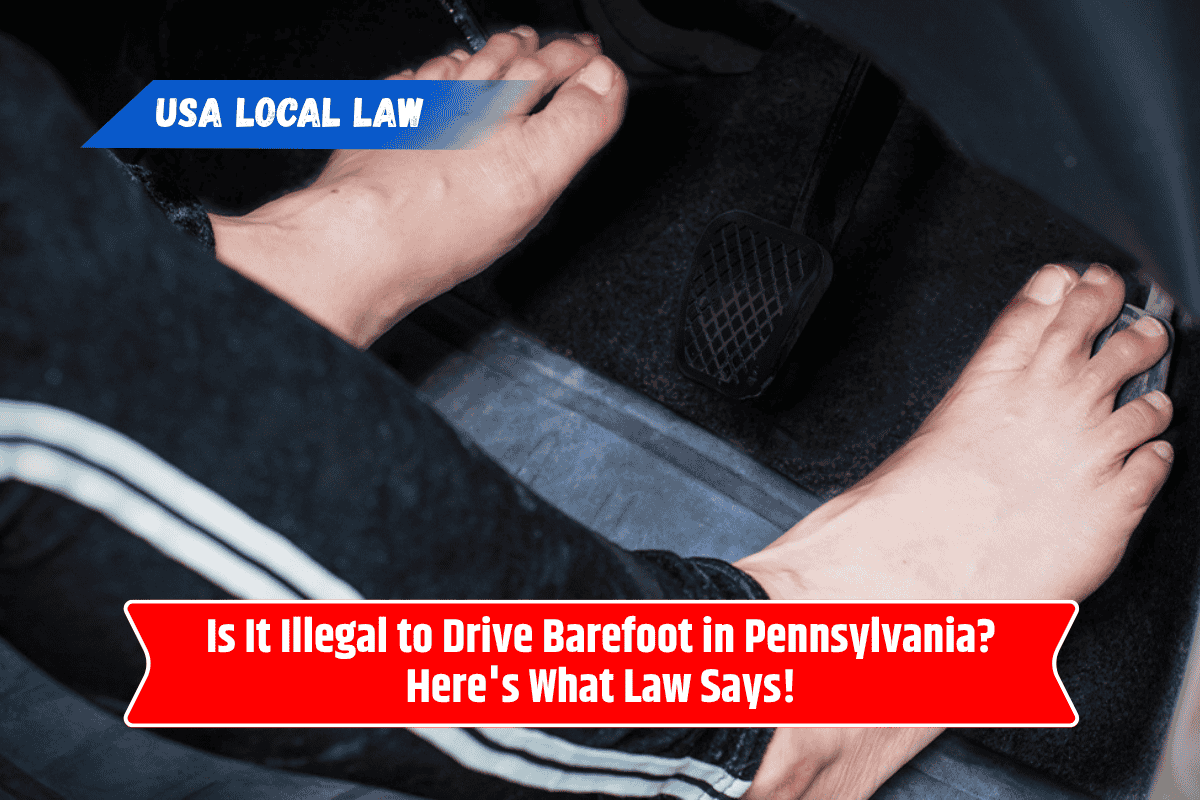Many drivers across the United States wonder if it’s illegal to drive barefoot. It’s a question that seems to come up frequently, especially for those who prefer the comfort of driving without shoes.
In Pennsylvania, like in most states, the law is not as strict as many people think. But before you slip off your shoes and hit the road, it’s important to understand the rules.
This article will break down what you need to know about driving barefoot in Pennsylvania, what the law says, and the potential risks involved. Let’s dive in and clear up the confusion!
Is It Illegal to Drive Barefoot in Pennsylvania?
The short answer is no—it is not illegal to drive barefoot in Pennsylvania. There are no specific laws in the state that prohibit driving without shoes. As long as you are in control of the vehicle and driving safely, you are not breaking any laws by going barefoot.
However, just because it’s not illegal doesn’t mean it’s always the best idea. In fact, there are some practical reasons why you might want to think twice before driving without shoes.
Why Is Driving Barefoot Not Recommended?
Even though it’s legal, driving barefoot can sometimes be risky. Here are a few reasons why it’s not always the best choice:
Lack of Foot Protection: Bare feet don’t have the same protection as shoes, which could increase the risk of injury in case of an accident or sudden braking.
Reduced Control: Without shoes, you may have less control over the pedals. Bare feet can sometimes slip, making it harder to apply consistent pressure on the brake or gas pedal.
Discomfort: Driving for long periods of time barefoot might get uncomfortable, especially if your feet sweat or if there’s a lot of dirt or gravel on the car floor.
While driving barefoot might feel comfortable for short distances, it may not be ideal for long drives or high-speed roads where you need more precise control over the vehicle.
What Happens If You Drive Barefoot and Cause an Accident?
If you drive barefoot and get into an accident, you could be found at fault if it’s determined that your lack of footwear contributed to the incident. For example, if your foot slipped off the pedal, or you had difficulty controlling the vehicle, it could be seen as negligence.
Even though there’s no law against driving barefoot, it’s important to remember that Pennsylvania law requires drivers to operate their vehicles in a safe manner.
If driving barefoot is deemed unsafe or careless, you could face legal consequences like fines or points on your driving record, just as you would if you were driving recklessly.
Are There Any Specific Laws Regarding Driving Barefoot in Other States?
Each state has its own rules about driving, but most states, including Pennsylvania, do not have any laws that specifically ban barefoot driving. Some states may have laws requiring drivers to maintain full control of their vehicle, which could indirectly affect those driving without shoes.
That being said, it’s always a good idea to check the local laws of the state you’re driving in if you plan on going barefoot. For example, in some states like Nevada, driving barefoot is legal, but wearing flip-flops while driving can be considered dangerous and lead to fines.
What Should You Do to Drive Safely?
While driving barefoot is legal in Pennsylvania, it’s always best to prioritize safety. If you prefer driving barefoot, here are some tips to stay safe on the road:
Make Sure Your Feet Are Clean: Clean feet can help you maintain control and prevent slipping on the pedals.
Keep Spare Shoes in the Car: It’s always a good idea to keep a pair of shoes in your car, just in case you need them for comfort or protection.
Test the Pedals: Before driving long distances, test how your foot feels on the pedals and make sure you can operate them safely.
Use Shoes When Driving Long Distances: For long drives or on highways, wearing shoes may be a better option for more control and comfort.
In Pennsylvania, it’s completely legal to drive barefoot, and there are no specific laws against it. However, while it’s not illegal, driving without shoes can be risky.
Bare feet offer less protection and control, especially in emergency situations or on long drives. It’s always best to prioritize safety by wearing proper footwear when driving.
Remember, regardless of the state you’re in, driving should always be done in a safe and responsible manner. Whether you prefer driving barefoot or with shoes, make sure you have full control of your vehicle and stay alert on the road.
